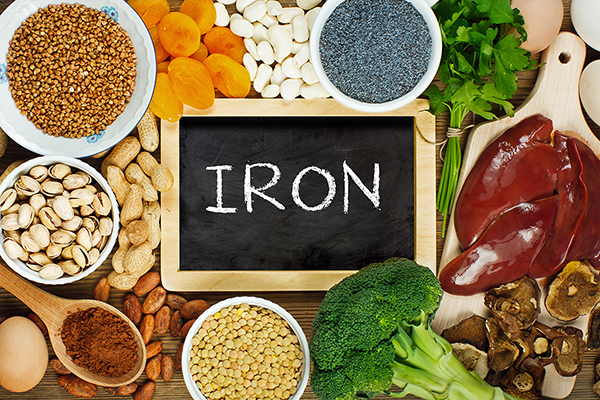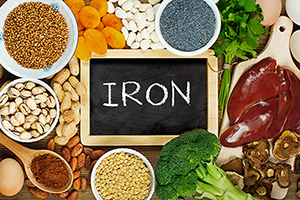
Iron is one of the most crucial nutrients for human health. Deficiencies of iron are extremely common, especially in women and children, and those with medical conditions associated with blood loss or malabsorption.
Iron deficiency is the most prevalent micronutrient deficiency worldwide, affecting more than 2 billion people. It’s estimated that 10 million Americans suffer from iron deficiency, with 5 million experiencing outright iron deficiency anemia, which is especially debilitating. Then there’s suboptimal iron, which may undermine the well-being of tens of millions more!
The cardinal symptom of iron deficiency is fatigue. That’s why Geritol, a pep-up tonic made famous on 50s game shows, helped enough people to make it a bestseller.
But iron is a Goldilocks mineral; too much can be bad for you. Depending on your diet, your underlying medical conditions, and your genetics, there are variable “just-right” levels for iron.
Additional signs of iron deficiency include brittle nails, rapid heart rate, and pale skin. But its manifestations may also may include attention deficit disorder, migraines, insomnia and restless leg syndrome, and hair loss and thinning. For some, low iron may play a significant role in anxiety and depression.
The tried and true narrative is that excess iron is a culprit in heart disease. It’s even been theorized that’s why men, who don’t menstruate or give birth, are more prone to middle-age heart disease (women eventually catch up after menopause).
Iron is a pro-oxidant that creates free radicals in tissues. Those with a hereditary predisposition to iron overload in a condition called hemochromatosis may develop liver damage, diabetes and neurodegenerative disease, as well as heightened cardiovascular risk. That’s why it’s important to establish whether you really need iron before taking a supplement; it also argues for choosing a multivitamin without iron, unless you’ve been specifically diagnosed with iron deficiency.
On the other hand, there’s evidence that inadequate iron is equally bad for the heart. A new study indicates that iron deficiency in middle age is linked with a higher risk of heart disease. It’s estimated that fully 10% of new coronary heart disease cases occurring within a decade of middle age could be avoided by preventing iron deficiency.
Iron deficiency also has an impact on immunity. It may undermine vaccine efficacy. Conversely, piling on iron supplements during an infection may be a bad idea. One review states: “Iron overload leads to inhibition of IFN-gamma, TNF-alpha, IL-12, and nitric oxide formation as well as impairment of macrophage, neutrophil, and T-cell function.”
When iron deficiency results in anemia due to blood loss and malabsorption in inflammatory bowel disease, oral iron supplements are often reflexively prescribed by less savvy clinicians. But there’s evidence that iron makes intestinal inflammation worse, and can promote overgrowth of harmful gut bacteria. In some of my anemic patients with ulcerative colitis we’ve bypassed their GI tracts with iron IVs.
Beef or chicken liver, mussels and oysters are prime sources of iron; so, too are beef, chicken (especially dark meat), pork, lamb and dark flesh fish like salmon and tuna.
Vegans are at risk for iron deficiency because, while foods like beans and leafy greens contain iron, it’s less bioavailable than heme iron present in animal products.
So, too, are endurance athletes. Apparently, all that pounding leads to cumulative blood loss from damaged muscles; high-intensity exercise may cause insidious seepage of blood from the GI tract. Runner’s anemia is acknowledged to be a problem in competitive athletics. One study remarkably found anemia had occurred in 87.5% of triathletes, and 31.3% of runners.
Certain medications may promote iron deficiency. Steroids, aspirin and non-steroidal anti-inflammatory drugs like ibuprofen are notorious for causing gastrointestinal bleeding, which may be gradual and difficult to detect; alternatively, they may result in a gusher of blood which is a medical emergency. Proton pump inhibitors used for GERD block iron absorption.
An interesting sidelight is that iron deficiency can distort the results of a hemoglobin A1c test used to assess blood sugar control. When present, low iron can spuriously increase hemoglobin A1c levels, especially in young women with moderately increased fasting glucose in the range 100-126.
(Next week, I’ll discuss tests for iron deficiency and the best ways to address it with diet and iron supplementation.)








